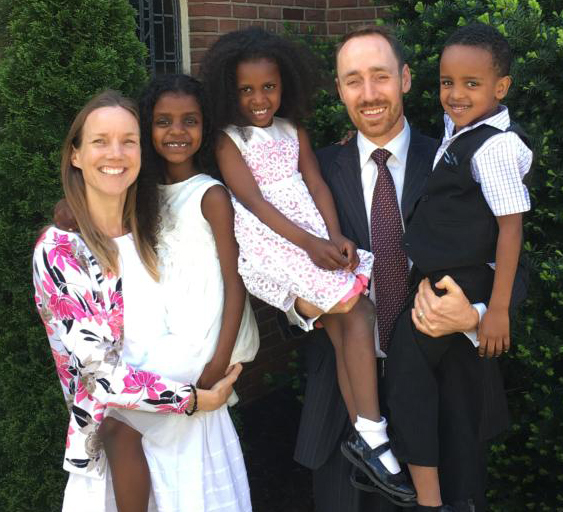
Maggie, Emebet, Teibe, Mark and Isayas Banga are pictured at Easter in 2019 in front of St. Jerome Parish Hyattsville, Md. (CNS photo/courtesy Mark Banga) See FAITH-ALIVE 25 May 16, 2019.
Being an adoptive father of three beautiful children has truly been a blessing. While my day-to-day role is largely the same as a biological father, my experience has helped me reflect on the way adoption makes a unique, symbolic contribution to illuminating the mystery of God’s love.
Adoption is a sign reminding Christians of the ultimate form of their vocation: adoptive divine sonship.
Catholic tradition describes salvation as becoming “sons in the Son” where Jesus Christ, the only-begotten Son, redeems man by restoring him as a child of God the Father: “God sent forth his Son … to ransom those under the law, so that we might receive adoption. … So you are no longer a slave but a child, and if a child then also an heir, through God” (Gal 4:4-7).
This was always God’s plan: “He destined us for adoption to himself through Jesus Christ” (Eph 1:5). Salvation is a restoration of belongingness through the gift of grace.
As adoptive parents, my wife and I have always tried through our words and actions to ensure that our children know they are loved and welcomed. An important task of being a father is to reflect God’s fatherhood by confirming the goodness of your children’s existence.
I have found that this is especially true for adoptive fathers, where children have their origin from “outside” (from other biological parents) and a separation has occurred. What the children need most is to know through love that it is good they exist and that they have a place of belonging “inside” your family.
[hotblock]
As an adoptive father, I have realized that God wants us as a married couple to be the “place” where our children find this belonging.
When we were discerning to adopt, there seemed to be a more intentional element of decision involved (than in biological birth) because we were actively undertaking a process. However, the more we thought of it, we realized that our decision rested within God’s more fundamental decision to bring our children into life and within his mysterious plan for our family.
What adoption reveals is that God never abandons his children. This is likewise true in the Christian life: No matter how fractured our life becomes by turning away from God, our belongingness never stops. God is always there with us, calling us home.
A significant moment for us was when our children’s identification documents were reissued with our family name now permanently given to them. This reminded us of our baptism as Christians, where God fully welcomes us into his family by imparting his name on us: “I baptize you in the name of the Father, the Son and the Holy Spirit.”
The name is a confirmation of God’s fatherhood and the Christian’s belonging in his household. As for our children, giving our family name was a sign of the gift of our fatherhood and motherhood to them forever.
Knowing all the challenges and struggles involved in daily life as a dad, I am constantly reminded that we can only love properly as fathers if we are receiving as children the love of the heavenly Father: “We love because he first loved us” (1 Jn 4:19).
This is the beautiful paradox: We learn to be fathers by becoming children; and we become children by following the Eternal Child. Jesus illuminates the way of the Christian life: learning to accept with full trust and confident obedience the love of our heavenly Father so that we can say with Jesus: “Abba! Father!” (Gal 4:6).
It is the form salvation takes: “Unless you turn and become like children, you will not enter the kingdom of heaven” (Mt 18:3).
Father’s Day is a great moment to remember that as Christians we are all invited to reflect on our shared vocation as adopted children of God, and some are called to make this form visible in the world by adopting a child into their home. I am grateful that God has called me to be a father in this specific way.
***
(After serving as Comboni Lay Missionaries in Ethiopia from 2010-2016, Mark and his wife Maggie relocated to Hyattsville, Maryland, along with their three children. Mark is currently a doctoral student in theological studies.)
PREVIOUS: My father, a man I once feared but came to love
NEXT: The real gifts Dad wants for Father’s Day


Share this story